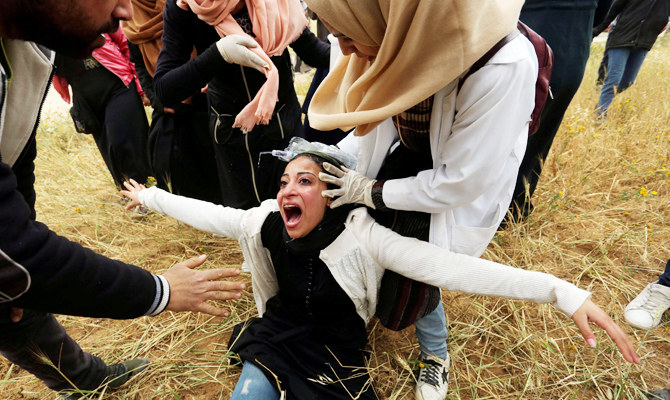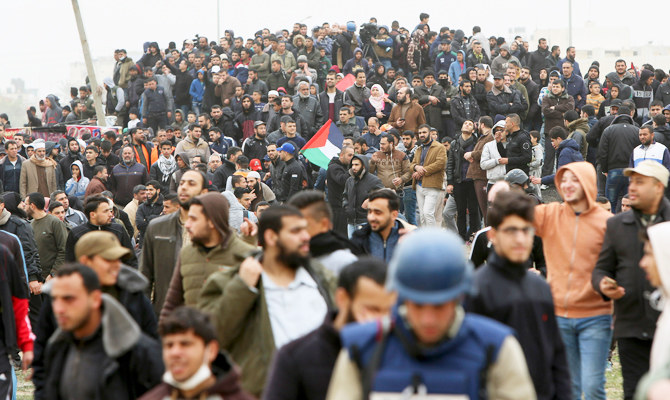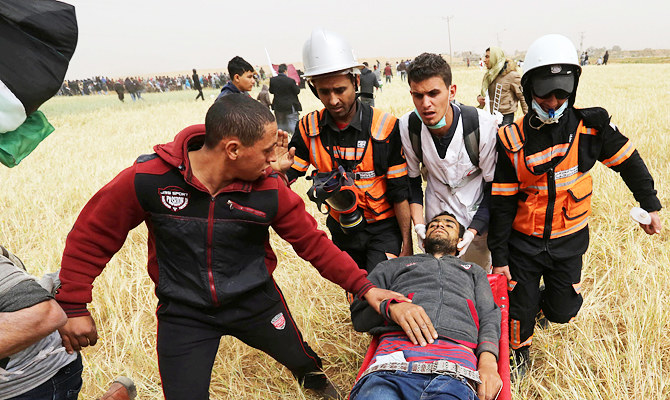GAZA CITY, Gaza Strip: Militants fired five rockets from Gaza into Israel early Sunday, the Israeli military said, following a day of Palestinian mass protests along the Israel-Gaza perimeter fence. Four Palestinians, including three teen-agers, were shot dead and dozens were wounded by Israeli soldiers.
The rocket fire threatened to undermine Egyptian-mediated efforts to cement a deal that the Gaza Strip’s Hamas rulers hope will ease a crippling Israeli-Egyptian blockade of the crowded territory.
No casualties were reported from the rockets and no Palestinian group claimed responsibility.
Tens of thousands of Palestinians rallied in the Gaza Strip on Saturday to mark the anniversary of their mass protests along the Israeli border.
Most demonstrators kept their distance from the border, though small crowds of activists approached the perimeter fence and threw stones and explosives toward Israeli troops on the other side. The forces fired tear gas and opened fire, killing four Palestinians and wounding 64.
Hamas had pledged to keep the crowds a safe distance from the fence to avoid inflaming the political atmosphere during negotiations of a possible easing of the blockade.
Hamas officials say that Israel is offering a package of economic incentives in exchange for calm along the volatile border.
Khalil Al-Hayya, a senior Hamas official, said the group had received “positive signs” from the Egyptians. He added that the Egyptian team was to return to Israel on Sunday to continue the talks. “We will continue our marches until all our goals are achieved,” he said.
Saturday’s protest came at a sensitive time, with Israel and Hamas, bitter enemies that have fought three wars and dozens of smaller skirmishes, both having a strong interest in keeping things quiet.
Israeli Prime Minister Benjamin Netanyahu is seeking his fourth consecutive term in April 9 elections, but is facing a serious challenge from a group of ex-army chiefs who have criticized what they say is his failed Gaza policy. With a lack of alternatives, Netanyahu has been forced at times to rely on Hamas to maintain stability along Israel’s volatile southern front.
In the final stretch of the campaign, Netanyahu needs to keep the Israel-Gaza frontier quiet, without seeming to make concessions to Hamas. Netanyahu took heavy criticism this week for what was seen as a soft response to renewed rocket fire out of Gaza.
Hamas, meanwhile, faces growing unrest in Gaza as a result of worsening conditions after more than a decade of an Israeli-Egyptian blockade. The two countries imposed the blockade in 2007 after Hamas, an Islamic militant group that seeks Israel’s destruction, seized control of Gaza from the internationally recognized Palestinian Authority.
The blockade has helped drive unemployment over 50 percent, led to chronic power outages and made it extremely difficult for Gazans to travel out of the territory.
Earlier this month, Hamas violently suppressed several days of public protests, staged under the slogan “We want to live,” over the dire conditions.
Speaking on the group’s Al-Aqsa TV station, Hamas’ top leader in Gaza, Yehya Sinwar, praised the protesters. “With this big turnout, our people say, ‘We want to live!“
His use of the protesters’ slogan appeared to be aimed at diverting the recent criticism of his group. Hamas blames the blockade and punitive measures by its West Bank-based Palestinian Authority for worsening the living conditions.
The fence protests, which began exactly a year ago, have been aimed in large part at breaking the Israeli-Egyptian blockade on Gaza, but haven’t delivered major improvements.
Saturday’s demonstrations were held at five rallying points along the border with Israel. Dozens of volunteers in fluorescent vests were deployed to restrain demonstrators, and cool rainy weather also appeared to affect enthusiasm.
But as the crowds swelled throughout the afternoon in response to Hamas’ calls for a large turnout, dozens of protesters approached the fence, unfurling Palestinian flags and throwing rocks and explosives toward Israeli soldiers. The Israeli forces responded with tear gas and live fire.
The Israeli military estimated 40,000 Palestinians were gathered at the marches.
“The rioters are hurling rocks and setting tires on fire. In addition, a number of grenades and explosive devices have been hurled at the Gaza Strip security fence,” it said in a statement.
In a statement, Prime Minister Netanyahu praised the army’s preparation and performance in maintaining “calm.”
Gaza’s Health Ministry said that a 17-year-old protester died immediately after being shot in the face in east Gaza City. In the evening, the ministry said another 17-year-old died hours after being shot in the chest in a different protest location.
A third teenager, also aged 17, succumbed to his wounds and died in the late evening. A 21-year-old Palestinian also died around dawn after sustaining injuries in overnight protests before the main demonstration.
While bloodshed was not avoided, it was far less than previous high-profile protests. Over 60 people were killed during intense protests on May 14, the day the US moved its embassy to Jerusalem.
As Saturday’s protest was winding down, organizers vowed to continue the marches and said they would gather again as usual next Friday.
The military released video footage showing large crowds of protesters gathered near the fence and hurling objects.
In one scene, a group of activists went up to the fence and hurled stones at the other side. In another scene, a youth could be seen trying to pull apart barbed wire along the fence.
The army also said it caught two young Palestinian children who had tried to cross the border with a knife. The children were returned to Gaza through a border crossing.
Earlier on Saturday, Gaza health officials said Israeli troops shot and killed a 21-year-old Palestinian man near the perimeter fence, hours before the mass rally.
The army said about 200 Palestinians “rioted during the night along the fence” and that the army used riot dispersal means against them.
The marches near were initially organized by grassroots activists who were calling for a mass return to ancestral homes in what is now Israel.
Hamas quickly took the lead in the protests, using the gatherings to call for an easing of the blockade.
The border marches routinely ended in confrontations, with some of the Palestinian demonstrators burning tires, hurling fire bombs or setting off explosives and Israeli troops firing live rounds and tear gas.
According to a Gaza rights group and a count by The Associated Press, 196 Palestinians were killed in the demonstrations over the past year, including 41 minors, and thousands were wounded by live fire. An Israeli soldier was also killed in the context of the marches.
Israel says the army has been defending the border. The army accuses Hamas of using the large crowds as cover and encouraging demonstrators to hurl explosives, incendiary balloons and grenades across the border. But Israel has come under heavy international criticism for the large number of unarmed people who have been harmed.
Egypt has repeatedly tried to broker a cease-fire between Israel and Hamas, stepping up efforts in recent days after a Gaza rocket struck a house in central Israel earlier this week, injuring seven Israelis and threatening renewed escalation.
Rockets from Gaza Strip hit Israel; 4 die at border protest
Rockets from Gaza Strip hit Israel; 4 die at border protest

- Palestinian officials said a 21-year-old was shot early Saturday at a protest camp near the fence
- The demonstrations mark the anniversary of anti-Israeli protests
Gaza’s Islamic Jihad says Israeli hostage tried to take own life

One of the group’s medical teams intervened and prevented him from dying, the Al Quds Brigades spokesperson added, without going into any more detail on the hostage’s identity or current condition.
Israeli authorities did not immediately respond to a request for comment.
Militants led by Gaza’s ruling Hamas movement killed 1,200 people and took 251 others hostage in an attack in southern Israel on Oct. 7, 2023, according to Israeli tallies. Hamas ally Islamic Jihad also took part in the assault.
The military campaign that Israel launched in response has killed more than 45,500 Palestinians, according to health officials in the coastal enclave.
Islamic Jihad spokesman Abu Hamza said the hostage had tried to take his own life three days ago due to his psychological state, without going into more details.
Abu Hamza accused Israeli Prime Minister Benjamin Netanyahu’s government of setting new conditions that had led to “the failure and delay” of negotiations for the hostage’s release.
The man had been scheduled to be released with other hostages under the conditions of the first stage of an exchange deal with Israel, Abu Hamza said. He did not specify when the man had been scheduled to be released or under which deal.
Arab mediators’ efforts, backed by the United States, have so far failed to conclude a ceasefire in Gaza, under a possible deal that would also see the release of Israeli hostages in return for the freedom of Palestinians in Israeli prisons.
Islamic Jihad’s armed wing had issued a decision to tighten the security and safety measures for the hostages, Abu Hamza added.
In July, Islamic Jihad’s armed wing said some Israeli hostages had tried to kill themselves after it started treating them in what it said was the same way that Israel treated Palestinian prisoners.
“We will keep treating Israeli hostages the same way Israel treats our prisoners,” Abu Hamza said at that time. Israel has dismissed accusations that it mistreats Palestinian prisoners.
Israeli airstrikes kill at least 16 in southern Gaza

At least 16 Palestinians were killed in two separate Israeli airstrikes in the southern Gaza Strip on Thursday, according to medics.
One strike targeted the Hamas-run interior ministry headquarters in Khan Younis, killing six people. Another airstrike hit a tent encampment in Al-Mawasi, a designated humanitarian zone for displaced civilians, killing at least 10 people, including women and children, and injuring 15 others.
Among the dead in the Al-Mawasi strike were Mahmoud Salah, Gaza's police chief, and his aide Hussam Shahwan, the head of Hamas security forces in southern Gaza, according to the Hamas-run Gaza interior ministry. The ministry condemned the attack, accusing Israel of seeking to deepen the humanitarian crisis in Gaza.
The Israeli military described the strike in Al-Mawasi as intelligence-based, targeting Shahwan but did not acknowledge Salah's death.
The Gaza health ministry reports over 45,500 Palestinians have been killed since the war began, with most of Gaza’s 2.3 million residents displaced and large portions of the territory in ruins. The conflict, now in its 15th month, began after Hamas’ cross-border attack on October 7, 2023, which killed 1,200 people and resulted in 251 hostages being taken to Gaza, according to Israeli authorities.
27 migrants die off Tunisia, 83 rescued, in shipwrecks: civil defence

TUNIS: Twenty-seven migrants, including women and children, died after two boats capsized off central Tunisia, with 83 people rescued, a civil defense official told AFP Thursday.
The rescued and dead passengers, who were found off the Kerkennah Islands off central Tunisia, were aiming to reach Europe and were all from sub-Saharan African countries, said Zied Sdiri, head of civil defense in the city of Sfax.
Syria forces launch security sweep in Homs city: state media

- Syrian security forces are conducting a security sweep in the city of Homs, state media reported on Thursday
DAMASCUS: Syrian security forces are conducting a security sweep in the city of Homs, state media reported on Thursday, with a monitor saying targets include protest organizers from the Alawite minority of the former president.
“The Ministry of Interior, in cooperation with the Military Operations Department, begins a wide-scale combing operation in the neighborhoods of Homs city,” state news agency SANA said quoting a security official.
The statement said the targets were “war criminals and those involved in crimes who refused to hand over their weapons and go to the settlement centers” but also “fugitives from justice, in addition to hidden ammunition and weapons.”
Since Islamist-led rebels seized power in a lightning offensive last month, the transitional government has been registering former conscripts and soldiers and asking them to hand over their weapons.
“The Ministry of Interior calls on the residents of the neighborhoods of Wadi Al-Dhahab, Akrama not to go out to the streets, remain home, and fully cooperate with our forces,” the statement said.
Rami Abdel Rahman, who heads the Britain-based Syrian Observatory for Human Rights war monitor, told AFP the two districts are majority-Alawite — the community from which ousted President Bashar Assad hails.
“The ongoing campaign aims to search for former Shabiha and those who organized or participated in the Alawite demonstrations last week, which the administration considered as incitement against” its authority, he said.
Shabiha were notorious pro-government militias tasked with helping to crush dissent under Assad.
On December 25, thousands protested in several areas of Syria after a video circulated showing an attack on an Alawite shrine in the country’s north.
AFP was unable to independently verify the footage or the date of the incident but the interior ministry said the video was “old and dates to the time of the liberation” of Aleppo in December.
Since seizing power, Syria’s new leadership has repeatedly tried to reassure minorities that they will not be harmed.
Alawites fear backlash against their community both as a religious minority and because of its long association with the Assad family.
Last week, security forces launched an operation against pro-Assad fighters in the western province of Tartus, in the Alawite heartland, state media had said, a day after 14 security personnel of the new authorities and three gunmen were killed in clashes there.
Palestinian Authority suspends broadcast of Qatar’s Al-Jazeera TV temporarily

- The authority accuses the broadcaster of sowing division in the Middle East and Palestine
- The authority says Al-Jazeera was airing 'inciting material' from Jenin camp in the West Bank
CAIRO: The Palestinian Authority suspended the broadcast of Qatar’s Al-Jazeera TV temporarily over “inciting material,” Palestinian official news agency WAFA reported on Wednesday.
A ministerial committee that includes the culture, interior and communications ministries decided to suspend the broadcaster’s operations over what they described as broadcasting “inciting material and reports that were deceiving and stirring strife” in the country.
The decision isn’t expected to be implemented in Hamas-run Gaza where the Palestinian Authority does not exercise power.
Al-Jazeera TV last week came under criticism by the Palestinian Authority over its coverage of the weeks-long standoff between Palestinian security forces and militant fighters in the Jenin camp in the occupied West Bank.
Fatah, the faction which controls the Palestinian Authority, said the broadcaster was sowing division in “our Arab homeland in general and in Palestine in particular.” It encouraged Palestinians not to cooperate with the network.
Israeli forces in September issued Al-Jazeera with a military order to shut down operations, after they raided the outlet’s bureau in the West Bank city of Ramallah.
















